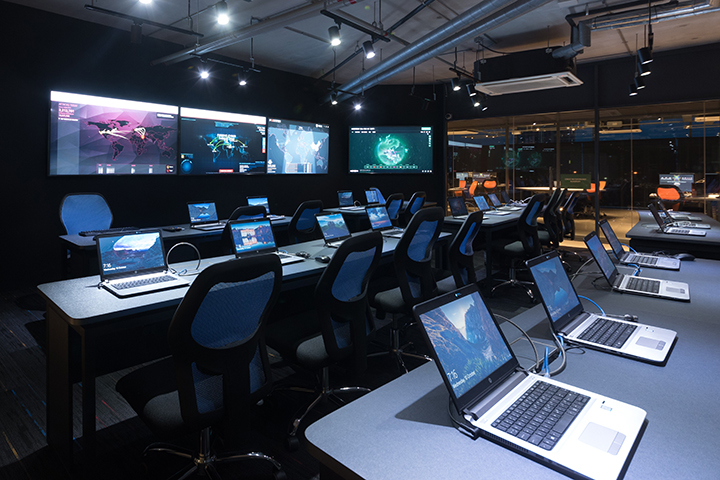Course Details

Dual Degree
APU-DMU Dual Degree Programme
DMU Degree Certificate will be an MEng Award for Engineering Programmes.
Requirements
Admission Requirements
- 2 Passes in STPM with a minimum Grade C (GP 2.0) in Mathematics and Physics (or Chemistry), and a Credit in Mathematics and Physics (or Chemistry) at SPM Level or its equivalent.
- 2 Passes (Grade A-D) in A-Level including Mathematics and Physics (or Chemistry).
- 5 Grade B’s in UEC, including Mathematics and Physics (or Chemistry).
- Passed the relevant Foundation programme (minimum CGPA of 2.0) with a Credit in Mathematics and Physics (or Chemistry) at SPM/O-Level/IGCSE or equivalent.
- Successful completion of the APU/APIIT Engineering Diploma and fulfilment of requirements for Credit Transfer, subject to the approval of the APU Academic Board OR
- Successful completion of a Diploma in Engineering with other recognised Institutions and fulfilment of requirements for Credit Transfer, subject to the approval of the APU Academic Board.
Candidates who wish to study Engineering Degree course must not be color blind or physically handicapped which makes him/her unable to conduct experimental/practical work and affect the learning process leading to potential errors towards professional practice as well. This is in line with the requirements of engineering professional bodies where safe engineering practices is mandatory. All International Students need to go through EMGS Medical Screening, if the student is found to be color blind; the Medical Screening maybe failed.
- IELTS : 5.0
- TOEFL IBT : 40
- Pearson (PTE) : 47
- MUET : Band 3.5
For more information please click HERE
PEO & PLO
-
Programme Educational Objectives
- Be a practicing engineer contributing to the development of Mechanical Engineering while demonstrating professionalism.
- Pursue engineering innovation via career advancement opportunities and/or advanced studies in Mechanical Engineering.
Mechanical Engineer plays a vital role in various industries by applying their expertise in designing, analysing, and maintaining mechanical systems and devices. This profession is at the heart of innovation, as mechanical engineers contribute to the development of cutting-edge technologies and the improvement of existing systems. Here's a brief overview of the role of a Mechanical Engineer:
- Automobile Design and Development
- Analysis and Testing of Machines
- Thermo fluids Problem Solving
- Prototyping and Manufacturing
- Project Management
- Research and Development
- Climate Control System Developer
- Regulatory Compliance
- Production and quality control
- Aircraft and Spacecraft Design Specialist
-
Programme Learning Outcomes
The students, upon completion of their study, should attain the following outcomes:
PLO1 Ability to gain and apply principles of Mathematics, Science and Engineering to the solutions of complex engineering problems. PLO2 Ability to undertake complex engineering problem analysis and apply engineering principles to solve them. PLO3 Ability to design innovative solutions for complex engineering problems. PLO4 Ability to investigate complex engineering problems using research techniques. PLO5 Ability to select and use suitable tools and techniques for complex engineering problems. PLO6 Ability to engage in professional engineering practice for safety, health, social, cultural and legal responsibilities in developing solutions for complex engineering problems. PLO7 Ability to comprehend and demonstrate good practices of engineering in sustainable development and environmental considerations for the solutions of complex engineering problems. PLO8 Ability to execute the responsibilities of an Engineer professionally and ethically. PLO9 Ability to function effectively as a team leader or a member in a team within multi-disciplinary settings. PLO10 Ability to communicate effectively and professionally on complex engineering activities. PLO11 Ability to demonstrate entrepreneurship skills, engineering project management and economic decision making in multidisciplinary environments. PLO12 Ability to recognise the need for, and be able to engage in independent and life-long learning towards continuous professional development.
What We Teach
This programme is specifically designed to provide students with:
- High quality internationally recognised and accredited engineering education through a robust curriculum that is firmly grounded with the fundamentals of contemporary practices of Mechanical engineering.
- In-depth knowledge of Mechanical Engineering principles through comprehensive yet contemporary coursework and hands-on projects coupled with the opportunity to work and gain experience with state-of-the-art facilities that assist in the promotion of deep and well-grounded understanding of mechanical engineering principles.
- The practical skill on how to ideate, plan, design and realise mechanical systems or prototypes through internationally recognised industrystandard software for simulations promoting the opportunity for a seamless integration with a fast moving forward workforce.
-
Degree Level 1
Students will understand the basic principles of engineering in the areas of Instrumentation and Measurement, Engineering Design, Engineering Materials and Manufacturing Technology. Other modules aim to provide the basic academic skills required to meet the demands of employers, as well as thorough grounding in principles of IT and entrepreneurship. Important and relevant skills for managing activities and for their own independent learning are also introduced.
Common Modules
- Engineering Materials
- Instrumentation and Measurement
- Programming with Python
- Engineering Design
- Engineering Mathematics 1
- Manufacturing Technology
- Engineering Mathematics 2
- Engineering Statics and Dynamics
- Thermodynamics
- Fundamentals of Entrepreneurship
-
Degree Level 2
Here, students start specialising in modules that develop the necessary underlying knowledge and skills in Mechanical Engineering with modules such as Strength of Materials, Fluids Mechanics, Safety in Oil and Gas Engineering, and Formation Evaluation and Well Logging and Petroleum Geochemistry.
Common Modules
- Digital Electronics
- Engineering Mathematics 3
- Introduction to Electrical Systems
- Strength of Materials
- Fluid Mechanics
- Innovation Processes
- Safety in Oil and Gas Engineering
- Formation Evaluation and Well Logging
- Petroleum Geochemistry
-
Degree Level 3
Specialised knowledge and skills in the areas of Control Engineering, Venture Building, Mechanics of Machine, Machine Design, Industrial Automation, Microprocessor Systems & Embedded Software, Advanced Manufacturing Technology, Computer Aided Engineering are the critical focus of this level. Elective modules included Machine Vision and Intelligence, Gas Engineering, Enhanced Oil Recovery a further development of the ability to apply relevant engineering skills with strong critical thinking and analysis. Independent learning continues in all modules.
Common Modules
- Control Engineering
- Venture Building
- Mechanics of Machine
- Machine Design
- Industrial Automation
- Microprocessor Systems & Embedded Software
- Advanced Manufacturing Technology
- Computer Aided Engineering
- Engineering Project Management
In the 2nd Semester of Year 3
Minor/ Extension Pathway (Choose 1)
- Choose 1 module from Minor Pathway OR Extension Pathway as described in the table below.
-
Internship (16 Weeks)
Students will undertake an Internship/Industrial Training for a minimum period of 16 weeks to prepare them for a smooth transition from the classroom to the working environment.
-
Degree Level 4
The final year Engineering modules provide the necessary industry application and technological skills which become very useful for employment upon graduation. Students’ personal and professional development, technical capability and understanding of how to innovate, generate and manage the creation of new ideas will be enhanced. Students will deliver several Engineering Projects where they will demonstrate higher level critical thinking, analysis and solutions development skills which will enhance their employability.
Common Modules
- Project Phase I (Investigation)
- Project Phase II (Implementation)
- Group Design Project I
- Group Design Project II
- Engineering Vibration
- Heat Transfer
- Engineer in Society
Minor/Extension Pathway (Choose 1)
- Choose 1 module from Minor Pathway OR Extension Pathway as a continuation from the module selected in Year 3 Semester 2 as described in the table below.
-
Mechanical Engineering Minor/Extension Pathways
Future Proof Engineers for the Real World
In APU, employment and it’s continual sustainability is of paramount importance to us. The range of minor and extensions offered to all students within the School of Engineering will craft a formidable way forward for the young aspiring engineers of tomorrow. These options allow students to embark on a journey of exploration either within the engineering fraternity by extending into greater depth (extensions) niche knowledge, skills and attributes required for the practice of contemporary engineering or explore wider options (minor) that are pivotal in the fundamental proliferation of the engineering profession as a while when coupled with other current multidisciplinary fields of expertise. Successful completion of either pathways future proof the students allowing them to embark on a journey of rewarding careers within an engineering discipline of their choice.
Minor Pathway – Gain breadth of knowledge by taking 3 set modules outside of a particular major field of study. There are minor packages available undertaken from Year 3 Semester 2 Year 4 Semester 1 and Year 4 Semester 2.MINOR PATHWAY
NAME OF MINOR Year 3 Semester 2 Year 4 Semester 1 Year 4 Semester 2 loT Knowledge Discovery and Big Data Analytics Internet of Things: Concepts and Applications Emergent Technology FinTech FinTech Governance, Risk Management & Compliance Digital Finance Robo Advisor Digital Transformation Digital Execution Digital Strategy & Analytics Emergent Technology Data Analytics Knowledge Discovery and Big Data Analytics Behavioral Science and Marketing Analytics Optimization & Deep Learning Artificial Intelligence Machine Vision Intelligence (MVI) Text Analysis & Sentiment Analysis Emergent Technology Digital Age Psychology Health Psychology Human Factors Psychology Cyberpsychology Extension Pathway – Expand depth of knowledge by taking three (3) set modules in a specific area within a certain field of study. There are extensions available undertaken from Year 3 Semester 2, Year 4 Semester 1 and Year 4 Semester 2.
EXTENSION PATHWAY
NAME OF EXTENSION Year 3 Semester 2 Year 4 Semester 1 Year 4 Semester 2 Unmanned Aerial
VehiclesMachine Vision Intelligence Robot Operating Systems Drone Technology Drilling Technology Drilling Fluids & Hydraulics Directional Drilling & Surveying Well Control Oil and Gas Operations Gas Engineering Petroleum Economics Drilling Fluids & Hydraulics Smart Robotics Machine Vision Intelligence Robot Operating Systems Product Creation
TechnologyEV Technology Machine Vision Intelligence EV Energy Management Strategies Automotive Vehicle Modelling Mining and Blasting Drilling Fluids & Hydraulics Directional Drilling & Surveying Mining and Blasting Prompt Engineering Machine Vision Intelligence Prompt Concepts and Applications Deep Learning -
MQA Compulsory Subjects*
- Appreciation of Ethics and Civilisation (M’sian Students)
- Malay Communication Language (Int’l Students)
- Philosophy and Current Issues
- Workplace Professional Skills
- Integrity and Anti-corruption
- Co-Curriculum
(*All students are required to successfully complete these modules as stipulated by the Malaysian Qualification Agency.)
Degree
Explore related programmes
Facilities at APU
The APU Centre Point & Atrium serves as a melting pot of cultures from all over the world. Here, cultural activities are organised regularly at the campus, fostering long-lasting intercultural relationships among APU students, who come from over 130 countries.
Ready, Set, Go.
* Fees stated here do not include Deposits and other Miscellaneous Fees. Please refer to Fee Guide for details.
RM28,200
Year 1
RM29,200
Year 2
RM30,200
Year 3
RM30,800
Year 4
RM118,400
Total for Malaysian
RM32,600
(USD8,580)
Year 1
RM33,600
(USD8,840)
Year 2
RM34,800
(USD9,160)
Year 3
RM36,200
(USD9,525)
Year 4
RM137,200
(USD36,105)
Total for International
Programme code : (N/0714/6/0005)(07/30)(MQA/PA16763)
All information is correct at the time of publication, but is subject to change in the interest of continuing improvement.
Note : All fees are payable in Ringgit Malaysia (RM). Any USD amounts indicated by APU are for reference only and are non-binding. The final amount payable is the RM amount stated in the official invoice, and the University will not entertain any claims arising from foreign exchange fluctuations.

Open Day
Learn More
Campus Facilities
Learn MoreEngineers Insight
English Language Study
Korean Language
Want to know more ?
Let’s Connect